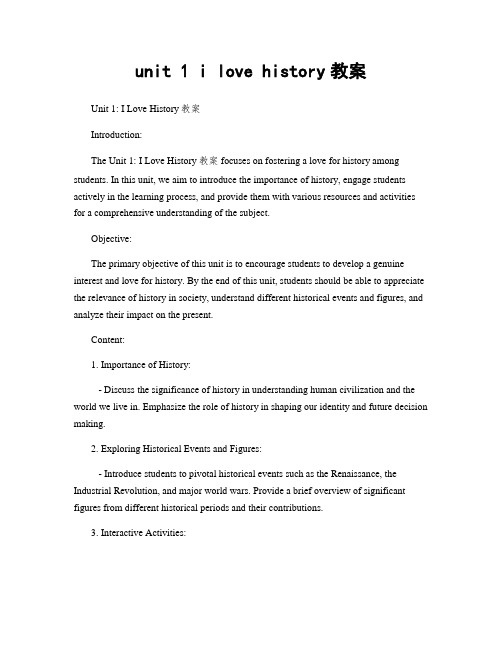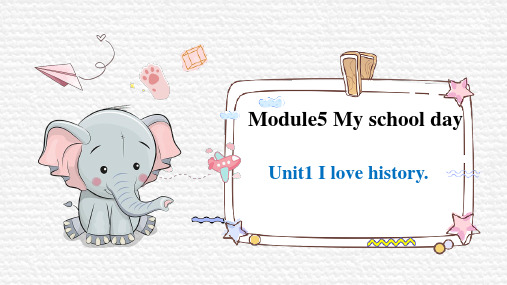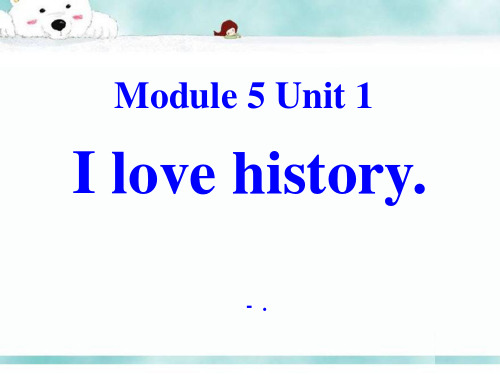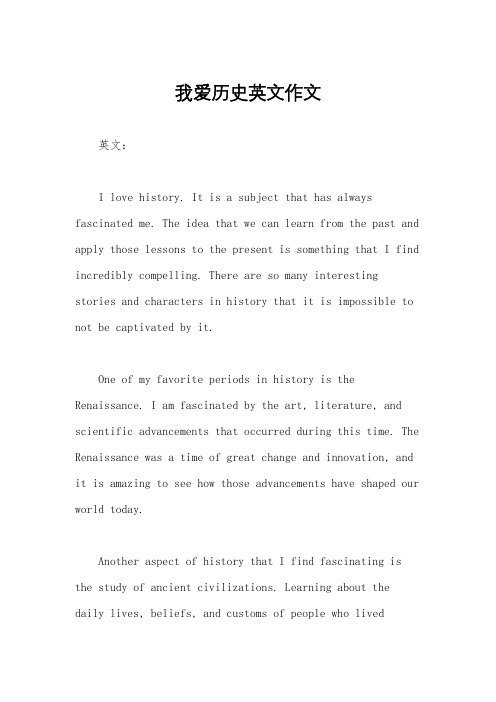I love history.
《I love history》PPT课件2

I likeI don’t like
Exercise
一、写出下列时间的表达法。
1) 7:00 _____________2) 9:30 _____________3) 6:20 _______________________4) 11:10 ______________________5) 5:55 _______________________6) 3:45 _____________________________
Match the words with the pictures. (Activity 2)
art geography Chinese English history IT maths PE
art
English
history
maths
一、选择正确答案
二、按要求改写句子。1. It’s Wednesday today. (就划线部分提问) 2. It’s ten o’clock now. (就划线部分提问)3. We have lunch at 12:00. (就划线部分提问) They do their homework in the evening. (变成一般疑问句)5. Lucy has English in the morning. (变成否定句)
English Proverbs
Study aims(学习目标)
English
art
maths
Chinese
history
science
Warming up
1. 谈论n.2. 差……prep.3. 课 n.4. …点钟 n.5. 一半 n.6. 超过 prep.7. 美术,艺术 n. 8. 地理 n.9. 历史 n.10.数学 n.11.开始 v.
I love history 优秀ppt课件

• • • • • • • • • • • • • • • • • • • •
1、快乐总和宽厚的人相伴,财富总与诚信的人相伴,聪明总与高尚的人相伴,魅力总与幽默的人相伴,健康总与阔达的人相伴。 2、人生就有许多这样的奇迹,看似比登天还难的事,有时轻而易举就可以做到,其中的差别就在于非凡的信念。 3、影响我们人生的绝不仅仅是环境,其实是心态在控制个人的行动和思想。同时,心态也决定了一个人的视野和成就,甚至一生。 4、无论你觉得自己多么了不起,也永远有人比更强;无论你觉得自己多么不幸,永远有人比你更不幸。 5、也许有些路好走是条捷径,也许有些路可以让你风光无限,也许有些路安稳又有后路,可是那些路的主角,都不是我。至少我会觉得,那些路不是自己想要的。 6、在别人肆意说你的时候,问问自己,到底怕不怕,输不输的起。不必害怕,不要后退,不须犹豫,难过的时候就一个人去看看这世界。多问问自己,你是不是已经为了梦想而竭尽全力了? 7、人往往有时候为了争夺名利,有时驱车去争,有时驱马去夺,想方设法,不遗余力。压力挑战,这一切消极的东西都是我进取成功的催化剂。 8、真想干总会有办法,不想干总会有理由;面对困难,智者想尽千方百计,愚者说尽千言万语;老实人不一定可靠,但可靠的必定是老实人;时间,抓起来是黄金,抓不起来是流水。 9、成功的道路上,肯定会有失败;对于失败,我们要正确地看待和对待,不怕失败者,则必成功;怕失败者,则一无是处,会更失败。 10、一句简单的问候,是不简单的牵挂;一声平常的祝福,是不平常的感动;条消息送去的是无声的支持与鼓励,愿你永远坚强应对未来,胜利属于你! 11、行为胜于言论,对人微笑就是向人表明:我喜欢你,你使我快乐,我喜欢见到你。最值得欣赏的风景,就是自己奋斗的足迹。 12、人生从来没有真正的绝境。无论遭受多少艰辛,无论经历多少苦难,只要一个人的心中还怀着一粒信念的种子,那么总有一天,他就能走出困境,让生命重新开花结果。 13、当机会呈现在眼前时,若能牢牢掌握,十之八九都可以获得成功,而能克服偶发事件,并且替自己寻找机会的人,更可以百分之百的获得成功。 14、相信自己,坚信自己的目标,去承受常人承受不了的磨难与挫折,不断去努力去奋斗,成功最终就会是你的! 15、相信你做得到,你一定会做到。不断告诉自己某一件事,即使不是真的,最后也会让自己相信。 16、当你感到悲哀痛苦时,最好是去学些什么东西。领悟会使你永远立于不败之地。 17、出发,永远是最有意义的事,去做就是了。当一个人真正觉悟的一刻,就是他放弃追寻外在世界的财富,开始追寻他内心世界的真正财富。 18、幻想一步成功者突遭失败,会觉得浪费了时间,付出了精力,却认为没有任何收获;在失败面前,懦弱者痛苦迷茫,彷徨畏缩;而强者却坚持不懈,紧追不舍。 19、进步和成长的过程总是有许多的困难与坎坷的。有时我们是由于志向不明,没有明确的目的而碌碌无为。但是还有另外一种情况,是由于我们自己的退缩,与自己“亲密”的妥协没有坚持到底的意志,才使得机会逝去,颗粒无收。 20、任何人都不可以随随便便的成功,它来自完全的自我约束和坚韧不拔的毅力。永远别放弃自己,哪怕所有人都放弃了你。
初中英语教案 I love history

初中英语教案I Love History第一章:古代文明1.1 目标:让学生了解古代文明,如古埃及、古希腊、古罗马等,并能够用英语简单描述。
1.2 教学内容:词汇:pyramid, pharaoh, democracy, gladiator, Rome, Athens等。
句型:What did you learn about ancient civilizations? Can you tell me something about?1.3 教学活动:教师展示图片,引导学生用英语描述古代文明的特点。
分组讨论,每组选择一个古代文明,用英语介绍其特点和历史意义。
第二章:中世纪时期2.1 目标:让学生了解中世纪时期的历史背景,如骑士、城堡、教会等,并能够用英语简单描述。
2.2 教学内容:词汇:knight, castle,教堂, Crusade, Middle Ages等。
句型:What did you learn about the Middle Ages? Can you tell me something about?2.3 教学活动:教师展示图片,引导学生用英语描述中世纪时期的特点。
分组讨论,每组选择一个中世纪时期的话题,用英语介绍其背景和历史意义。
第三章:文艺复兴时期3.1 目标:让学生了解文艺复兴时期的文化和艺术成就,如达芬奇、米开朗基罗等,并能够用英语简单描述。
3.2 教学内容:词汇:Renssance, Leonardo da Vinci, Michelangelo, pnting, sculpture等。
句型:What did you learn about the Renssance? Can you tell me something about?3.3 教学活动:教师展示图片,引导学生用英语描述文艺复兴时期的文化和艺术成就。
分组讨论,每组选择一个文艺复兴时期的话题,用英语介绍其特点和历史意义。
Module 5 Unit 1 I love history(解析版)

姓名:班级Module 5 My school dayUnit 1 I love history.本课重点Half, past, geography, history, lesson, subject, beginhave Chinese 有中文课at five to nine 八点五十五in the afternoon 在下午be good at 擅长做…have four lessons 有四节课be difficult for sb. 对某人来说是困难的have art 有艺术课本课难点能够用一般现在时描述什么时间上什么科目常考句型 1. I love history and I’m good at it. 我喜欢历史课,并且我很擅长。
2. I can talk with my Chinese frien ds. 我能和我的中国朋友交流。
3. They have four lessons in the morning. 他们早上有四节课。
4. History is interesting for Betty.贝蒂对历史有兴趣。
一、单项选择1.— ________ is your PE lesson?—Four o’clock.A.How much B.What day C.How many D.What time2.We can read 10:15 like this: ________.A.a quarter to ten B.a quarter past tenC.ten fifteen D.B and C3.— What time is it now? —It’s ________.A.at three o’clock B.three o’clockC.at a quarter at three D.a quarter at three4.We have English ________ eight.A.at B.on C.in D.to5.Music and art ________ my favourite lessons.A.is B.are C.have D.be二、用所给单词的正确形式填空6.Anna enjoys ________(learn)about new things, so she reads newspapers every day. 7.My mother is a junior high school teacher and she ________(teach)maths. 8.The child is five years old and he can brush his ________(tooth).9.There ________(be)an apple and three glasses of water on the table.10.I’ll remember ________(tell)him about the thing.11.I like _____________(talk)with my friends in my free time.12.We usually have four ______________(lesson)in the morning on weekdays. 13.My father____________(love)me and I love him a lot too.14.My brother is really good at ___________(swim).15.English and maths are Tony's favourite_____________(subject).三、句型转换16.We have a break. We talk to our friends.(合并为一句)We have a break ________ ________ ________ our friends.17.I have art this afternoon.(改为否定句)I ________ ________ ________ this afternoon.18.I like healthy food.(改为一般疑问句)________ ________ ________ healthy food?19.Their science lesson is at nine o’clock.(对画线部分提问)________ ________ their science lesson?20.She does the housework every day.(改为否定句)She ________ ________ the housework every day.21.Liu Ming cleans the room every week.(改为一般疑问句)________ Liu Ming ________ the room every week?22.We have maths this afternoon.(改为否定句)We ________ ________ maths this afternoon.23.Sally is thirteen years old.(对画线部分提问)________ ________ is Sally?24.Jerry can play basketball very well.(改为一般疑问句)________ Jerry ________ basketball very well?25.My favourite subject is Chinese.(对画线部分提问)________ ________ favourite subject?四、完型填空I am Tim. I am a(n) 26 in a middle school. This is my school day. I usually 27 at half past six. At seven o'clock,I have breakfast with my 28 .After that,they go to work and I go to(a) 29 .Classes begin at eight. We have four 30 in the morning. I like 31 classes very much and my English is good. I have 32 at school at twelve. After school I don't go home but 33 on the playground with my classmates. I get home at five thirty and have supper at 34 o'clock. I do my homework at eight. After that I watch TV for twenty minutes. I 35 at ten. It is a busy day.26.A.teacher B.student C.doctor D.postman27.A.get up B.stand up C.look up D.stay up28.A.students B.friends C.parents D.cousins29.A.school B.shop C.park D.hospital30.A.meals B.classes C.apples D.jobs31.A.English B.maths C.music D.art32.A.breakfast B.lunch C.supper D.dinner33.A.wash hands B.read a book C.play games D.play the piano34.A.six B.nine C.eleven D.twelve35.A.go shopping B.go swimming C.go to bed D.go to work参考答案1.D【详解】句意:——你的体育课几点?——4点。
初中英语教案 I love history

初中英语教案I Love History一、教学目标1. 知识目标:(1)学生能够掌握与历史相关的词汇和表达方式。
(2)学生能够听懂、说出一系列与历史相关的话题。
(3)学生能够通过阅读和写作,表达自己对历史事件和人物的看法。
2. 能力目标:(1)学生能够运用所学的词汇和表达方式,进行简单的日常对话。
(2)学生能够阅读和理解与历史相关的短文。
3. 情感目标:(1)学生能够对历史产生兴趣和好奇心。
(2)学生能够学会尊重和理解不同的文化背景。
二、教学重难点1. 重点:(1)学生能够掌握与历史相关的词汇和表达方式。
(2)学生能够听懂、说出一系列与历史相关的话题。
(3)学生能够通过阅读和写作,表达自己对历史事件和人物的看法。
2. 难点:(1)学生能够运用所学的词汇和表达方式,进行复杂的日常对话。
(2)学生能够阅读和理解与历史相关的长篇文章。
三、教学方法1. 任务型教学法:通过设计各种历史相关的情境和任务,让学生在实践中学习和应用英语。
2. 交际型教学法:通过组织学生进行角色扮演、小组讨论等活动,提高学生的听说能力。
3. 情境教学法:通过展示历史图片、视频等,创设历史情境,激发学生的学习兴趣。
四、教学过程1. 引入:(1)教师展示一些历史相关的图片或视频,引导学生谈论他们对历史的看法。
(2)学生分享他们对历史的兴趣和了解。
2. 讲解:(1)教师讲解与历史相关的词汇和表达方式。
(2)学生通过例句和练习,掌握这些词汇和表达方式的用法。
3. 实践:(1)学生进行小组讨论,讨论他们感兴趣的历史话题。
(2)学生进行角色扮演,模拟历史场景,运用所学的词汇和表达方式。
4. 巩固:(1)教师设计一些历史相关的情境,让学生进行听力练习。
(2)学生听懂并回答问题,提高他们的听力能力。
五、作业布置1. 学生回家后,找一篇关于历史的小短文,阅读并理解其内容。
2. 学生根据所学的词汇和表达方式,写一篇关于自己喜欢的historical figure 的小短文。
unit 1 i love history教案

unit 1 i love history教案Unit 1: I Love History教案Introduction:The Unit 1: I Love History教案 focuses on fostering a love for history among students. In this unit, we aim to introduce the importance of history, engage students actively in the learning process, and provide them with various resources and activities for a comprehensive understanding of the subject.Objective:The primary objective of this unit is to encourage students to develop a genuine interest and love for history. By the end of this unit, students should be able to appreciate the relevance of history in society, understand different historical events and figures, and analyze their impact on the present.Content:1. Importance of History:- Discuss the significance of history in understanding human civilization and the world we live in. Emphasize the role of history in shaping our identity and future decision making.2. Exploring Historical Events and Figures:- Introduce students to pivotal historical events such as the Renaissance, the Industrial Revolution, and major world wars. Provide a brief overview of significant figures from different historical periods and their contributions.3. Interactive Activities:- Conduct group discussions, debates, and presentations on various historical topics to encourage active participation and critical thinking skills. Assign individual research projects to allow students to delve deeper into specific historical periods or events.4. Multimedia Resources:- Utilize multimedia resources like documentaries, historical films, and online archives to make history come alive and engage students visually and audibly.5. Field Trip:- Organize a field trip to a local museum, historical site, or exhibition related to the topics covered. This hands-on experience will enable students to connect with history in a tangible way.Assessment:1. Quizzes and Tests:- Conduct regular quizzes and tests to assess students' comprehension of the historical concepts and events covered in the unit.2. Projects and Presentations:- Evaluate students' research projects and presentations based on their ability to effectively communicate historical knowledge, present arguments, and analyze different perspectives.Conclusion:The Unit 1: I Love History教案 seeks to ignite a passion for history among students. By introducing the importance of history, exploring historical events and figures, engaging in interactive activities, utilizing multimedia resources, and organizing a field trip, students will develop a love for history that extends beyond the classroom. The assessments will gauge their understanding and ability to apply historical knowledge in a meaningful way.。
为什么喜欢历史英语作文

为什么喜欢历史英语作文I love history. It's like a giant puzzle with endless pieces to discover. Each era, each event, is a new cluethat helps me understand the past and appreciate the present.Studying history is like going on an adventure. You never know what fascinating story you'll uncover or what remarkable figure you'll meet. It's exciting to delve into the lives of kings and queens, warriors and scholars.One of the coolest things about history is that it's everywhere. You can find it in ancient ruins, in old books, even in the streets of modern cities. It's a living, breathing thing that surrounds us all the time.And history teaches us valuable lessons. It shows ushow societies have evolved, how wars have changed the world, and how people have overcome challenges. It reminds us of our mistakes so we don't repeat them.Plus, history is just so interesting! I love learning about different cultures, traditions, and ways of life.It's amazing to see how diverse the human experience can be.So why do I love history? Because it's a never-ending story of humanity, full of surprises, wisdom, and inspiration. It's a window to the past that helps us understand ourselves and the world we live in.。
《I love history》PPT课件

be good at … 意思是 “擅长……”+名词/动词ing Tom is good at playing basketball. Linda is good at English.
Language points
3. It’s my favourite subject because it’s very interesting.
Exercise
写出下列时间的表达法。
1. 9:00 _n__in__e__o_’__c_l_o_ck 2. 9:30 _h__a_l_f_p__a_s_t__n_ine 3. 10:20 t_e_n___tw__e__n_t_y_/_t_w__e__n_t_y__p_ast ten 4. 11:10e_l_e_v__e_n__t_e_n__/_t_e_n__p_a__s_t_eleven 5. 4:55 _f_o_u__r_f_i_f_t_y_-_f_i_v_e_/_f_i_v_e__t_o five 6. 2:45 _t_w__o__f_o_r_t_y__-_fi_v_e__/_a__q_u__a_r_t_e_r__to three
because 是连词,意为“因为”。 Jack can’t go to school, because he is ill. because的对应词是so,意为所以。 在英语中because 和so不能在同一个句子中出现。
I don’t like geography because it’s very difficult. = Geography is very difficult, so I don’t like it.
Activity 5
Listen and repeat
/ u: / afternoon / ʊ / good / ɔ: / talk / ɒ / because o’clock
外研版英语七年级上册Module 5 Unit1 I love history课件

like作动词时,意为“喜欢”;作介词时,意为“像”,可 与be或look连用。 eg:It is like a bird.
它像一只鸟。
5 difficult/'dɪfɪklt/ adj.困难的
辨析difficult和hard difficult与hard用作形容词时,均可表示“困难的”,其 反义词为easy。一般情况下能互换,但两者之间也有区别:
介词 用法
in
表示“月、季节、年、世纪”或泛指“上午、下午、晚 上”。eg:in May在五月,in the evening在晚上
表示“在具体的某一天”或“(在具体的某一天的)早上、
on
下午、晚上”等,“在星期几”或“在星期几的早上、下 午、晚上”等,“在某一节日”。eg: on Sunday morning
2:45读作:a quarter to three 表示“在某一时刻”,即“在某时间点”,应该用介词at。 eg:at three o'clock在3点钟
对时刻提问时,一般用what time。 eg:—What time is it now?现在几点了?
—It's half past seven.七点半。
3 maths/mæθs/n.数学
eg:Do you like maths?你喜欢数学吗? maths是mathematics的缩写形式,英国英语中常用maths,美国英 语中常用math。 中学常见学科如下:Chinese语文 maths数学 English英语 physics 物理 chemistry化学 science科学 biology生物 politics政治 history历 史 geography地理 art美术 music音乐 PE (physical education)体育
《I love history》PPT课件3

Complete the passage with the correct form of the words from the box.
because difficult favourite interesting lesson subject
2. 用来征询对方的看法或意见。如: What about the TV play? 那个电视剧怎么样? 3. 用来向对方提出建议或请求, 相当于 Would you like to ...? 。如: What about going out for a walk? 出去散散步好吗?
11:40 It’s twenty to twelve.
6:45
The way of telling the time
three o’clockfour fifteen / a quarter past fourtwo ten / ten past twoseven forty-five / a quarter to eightsix thirty / half past sixfive thirty-five / twenty five to six
a quarter = 15 minutes
one twenty
twenty past one
three seventeen
seventeen past three
six twenty-five
twenty-five past six
1:20
3:17
6:25
What time is it ?
What’s the time?
I love history.
Unit 1 I love history.教学设计

利用多媒体播放听力录音,布置任务。
学生跟读三遍并齐读一遍。
进一步加深对时间读法的认识。
Step 5 Practice One(操练)
利用多媒体再次展示课程时间表,学习句型“We have…at….”。
Practice Two(练习)
Use the ppt. to show the practicห้องสมุดไป่ตู้.
3.合作学习策略:建立小组讨论、交流与合作的课堂氛围。
4.听录音:通过听录音,进一步加深对时间读法的理解。
五、教学重点及难点
1.【教学重点】词汇:half, past, o’clock, to, lesson, like, difficult, love, because, interesting。
5.通过预测题目的编制使用情况知道学生对英语学习有着浓厚的兴趣,但是英语的听读水平仍有待增强。
四、教学策略选择与设计
1.多媒体教学:利用幻灯片向学生展示本班的课程表,激发学生的兴趣;然后通过师生对话,让学生熟悉两两说话的内容和方式并为对话练习做准备。
2.情景创设策略:使用一个闹钟引出相关时间的表达法,进而练习新授内容。
句型:It’s half past six.
We have Chinese at eight o’clock.
2.【教学难点】学生能够熟练使用新句型实行日常交际。
六、教学过程
教师活动
预设学生活动
设计意图
Step 1 Warming-up / Revision(热身、复习)
Show an English book to review“What’s this in English?”.
初中英语教案 I love history

初中英语教案I Love History第一章:古代文明1.1 目标:了解古代文明的发展和重要事件,提高学生的英语听力、口语和阅读能力。
1.2 教学内容:词汇:pyramid, pharaoh, democracy, gladiator,zantique, civilization听力:听关于古代文明的故事或对话阅读:阅读关于古代文明的短文口语:讨论古代文明的重要事件和人物1.3 教学活动:引入:展示图片或视频,引导学生思考古代文明的特点听力活动:播放故事或对话,学生回答问题阅读活动:学生阅读短文,回答问题,讨论内容口语活动:学生分组讨论,分享对古代文明的看法1.4 作业:写一篇关于古代文明的短文练习古代文明相关的词汇和语法第二章:中世纪欧洲2.1 目标:了解中世纪欧洲的历史背景和重要事件,提高学生的英语听力、口语和阅读能力。
2.2 教学内容:词汇:medieval, knight,城堡, cathedral,quiz听力:听关于中世纪欧洲的故事或对话阅读:阅读关于中世纪欧洲的短文口语:讨论中世纪欧洲的重要事件和人物2.3 教学活动:引入:展示图片或视频,引导学生思考中世纪欧洲的特点听力活动:播放故事或对话,学生回答问题阅读活动:学生阅读短文,回答问题,讨论内容口语活动:学生分组讨论,分享对中世纪欧洲的看法2.4 作业:写一篇关于中世纪欧洲的短文练习中世纪欧洲相关的词汇和语法第三章:世界战争3.1 目标:了解世界战争的历史背景和重要事件,提高学生的英语听力、口语和阅读能力。
3.2 教学内容:词汇:war, battlefield, soldier, victory, defeat听力:听关于世界战争的故事或对话阅读:阅读关于世界战争的短文口语:讨论世界战争的重要事件和人物3.3 教学活动:引入:展示图片或视频,引导学生思考世界战争的特点听力活动:播放故事或对话,学生回答问题阅读活动:学生阅读短文,回答问题,讨论内容口语活动:学生分组讨论,分享对世界战争的看法3.4 作业:写一篇关于世界战争的短文练习世界战争相关的词汇和语法第四章:工业革命4.1 目标:了解工业革命的历史背景和重要事件,提高学生的英语听力、口语和阅读能力。
外研版英语(新标准)七年级上册Module 5 My school day模块知识点归纳总结

Module 5 My school dayI love history.必背单词1.half (n.)一半→halves (pl.)2.difficult (adj.)困难的,难懂的→difficulty (n.)困难3.interesting (adj.)有趣的→interested (adj.)感到有趣的(主语为人) 4.past (prep.)晚于,过(几点)5.o'clock (adv.)……点钟6.to (prep.)(距整点时间)差……7.art (n.)美术;艺术8.geography (n.)地理9.history (n.)历史10.maths (n.)数学11.PE (n.)体育;体育课12.lesson (n.)(一节)课13.then (adv.)接着,然后14.like (v.)喜欢;喜悦15.love (v.)爱,热爱(n.)喜爱;关爱16.subject (n.)科目17.because (conj.)因为18.talk (v.)谈论,说话19.begin (v.)开始20.when (adv.)什么时候,何时必背短语21.on Monday在星期一22.five to nine八点五十五23.have maths上数学课24.talk with...和……交谈25.be good at擅长必背句子26.At twenty past ten we have IT.在十点二十分,我们上信息技术课。
27.Do you like maths, Tony?你喜欢数学吗,托尼?28.I like the lessons on Monday afternoon: English and art.我喜欢周一下午的课:英语和美术。
29.It's my favourite subject because it's very interesting.它是我最喜欢的学科,因为它很有趣。
我爱历史英文作文

我爱历史英文作文英文:I love history. It is a subject that has always fascinated me. The idea that we can learn from the past and apply those lessons to the present is something that I find incredibly compelling. There are so many interestingstories and characters in history that it is impossible to not be captivated by it.One of my favorite periods in history is the Renaissance. I am fascinated by the art, literature, and scientific advancements that occurred during this time. The Renaissance was a time of great change and innovation, and it is amazing to see how those advancements have shaped our world today.Another aspect of history that I find fascinating is the study of ancient civilizations. Learning about thedaily lives, beliefs, and customs of people who livedthousands of years ago is truly remarkable. The ancient Egyptians, Greeks, and Romans are just a few examples of civilizations that have left a lasting impact on our world.中文:我热爱历史。
2019年外研版七年级英语上册课件:Module 5 Unit 1 I love history(共48张PPT)

Unit 1 I love history.
例 (2017重庆江津区五校期末联考)His brother TV every day. A.watch;on B.watches;in C.watches;on D.watch;in
sports
解析 句意:他的弟弟每天在电视上看体育节目。主语是his brother,故 要用第三人称单数形式watches,先排除A和D;on TV意为“在电视上”, 故答案为C。 答案 C
意为“感兴趣的”,常用来修饰人。be/become interested in意为“对 ……感兴趣”
Unit 1 I love history.
巧记 We are interested in the interesting book.我们对那本有趣的书感 兴趣。
例 (2018上海川沙中学南校自主调研)用所给词的适当形式填空
Unit 1 I love history.
知识点四 行为动词的一般现在时的一般疑问句 教材原文 Do you like maths,Tony?托尼,你喜欢数学吗? 本句是行为动词的一般现在时的一般疑问句,结构是“Do/Does+主语+ do...?”。当主语是第三人称单数时,要用does。如: Does she like listening to music?她喜欢听音乐吗? 拓展 该一般疑问句有两种答语形式,肯定答语是“Yes,主语+do/ does.”,否定答语是“No,主语+don't/doesn't.”。如: —Does she like English?她喜欢英语吗? —Yes,she does.是的,她喜欢。 注意
Unit 1 I love history.
Module5导学案2021-2022学年外研版七年级英语上册

Module 5 My school dayUnit 1 I love history .【学习目标】:知识与技能:1、学会本单元重点词汇:从half到when ; 句型: It’s +点钟. We have +学科. Do you like… ? When is …?2、掌握时间表达法和有关科目名称。
3、行为动词的一般现在时(I)过程与方法:1.以听促说,听说结合,增加语音知识的输入。
2.调动学生自主学习,合作探究的欲望,创设语境,让学生在表演中体会学习的乐趣。
3.教师的有效指导,加强小组的合作学习。
情感态度价值观:了解国外同龄学生所学的科目,增加文化交流,提高学习兴趣。
【学习重难点】各学科名词,时间表达法.【导学探究】:一:预习交流自学指导:1.在课文中找出下列词组,进行课前朗读,十二点钟__________一点二十_________六点半___________ 十点四十____________在星期一________ 上语文课________上一节英语课_________我最喜爱的课_______________ 在八点钟____________ 在九点五十五____________2.试着了解时间的表达法: Ask and answer. What time is it?1.__________2.__________3.__________4.__________①It’s …o’clock.. ②It’s half past…③It’s … past … ④It’s … to ….3.两人一组操练英语时间表述句型: A:What time is it ? /What’s the time ? B: It’s half past eight . It’s six o’clock .二:合作探究【任务一】Activity 1.读前听:听对话,选出正确答案。
Why does Betty like history ?A :Because It`s very difficult .B : Because It`s very interesting.【任务二】Activity 2 听后读(阅读):学生默读对话,进一步理解对话内容,完成 Activity 3-4.【任务三】听后表演Work in groups :分角色朗读对话。
- 1、下载文档前请自行甄别文档内容的完整性,平台不提供额外的编辑、内容补充、找答案等附加服务。
- 2、"仅部分预览"的文档,不可在线预览部分如存在完整性等问题,可反馈申请退款(可完整预览的文档不适用该条件!)。
- 3、如文档侵犯您的权益,请联系客服反馈,我们会尽快为您处理(人工客服工作时间:9:00-18:30)。
afternoon history 1:40 English 3:30 geography 1:40 Chinese 4:35
Wednesday
English maths
8:00 9:35
history
3:30
What are our lessons on Monday (Tuesday...)? We have Chinese at eight o’ clock on Monday morning. We have......at......on......
Homework
• 1. Remember all the words and phrases we have learnt today.熟记本节课所学单词 和词组。 • 2.Finish the exercises on P27.完成课本27 页习题。 • 3.Recite the passage.背诵课文。
n.
•
• • • • • • •
then adv. 然后,接着 difficult adj. 困难的,难懂的 interesting adj. 有趣的 begin v. 开始 when adv. 什么时候,何时 half n. 一半 past prep. 晚于,过(几点) o’ clock adv. ......点钟 to prep. (距整点时间)差......
Day Monday Tuesday Wednesday
morning
Chinese 8:00 geography 10:45
afternoon history 1:40 English 3:30 geography 1:40 Chinese 4:35 history 3:30
English 8:50 IT 9:35 English maths 8:00 9:35
Listening
Listen and fill the blanks with T or F. 1.Lessons begin at eight.( T )
2.They have four lessons in the morning.( T ) 3. Maths is difficult for Betty.( F ) 4. They have art on Monday.( T ) 5.History is interesting for Betty.( T ) 6. Tony’s favourite lesson is art.( F )
Morning English Time 8:00-8:40
A: What time do we have English.
B: We have English at 8:00. A: Do we have P.E in the afternoon? B: Yes, we do.
Maths
Geography Politics Biology
Exercise
1.My parents go to bed_____ about ten A o’clock every day. A. at B. in C. on D. for C 2. We ____ an English lesson on Monday. A. go B. do C. have D. get 3.They have lunch at_____ every day. B A. May B. twelve C. Sunday D. evening C 4.Liu Xiang is good at_____. A. run B. runs C. running D runing
√
√
Reading
• 1.What are our lessons on Monday? • on Monday 具体到某一天,或某一天上下午用介 词on • 例如: I like the lessons on Monday afternoon. • 2. We have Chinese at eight o’clock.
minute hand
dial plate
hour hand
12
o’ clock
9
to
6
past 3
o’ clock
• 英语时间表达法
• 如果是半小时以内的时间,一般用几点过 几分的表达方式,即“... past...” • 如果超过了半个小时,则用还差几分不到 几点的表达方式,即“... to...” • 半个小时则用half past...
• have Chinese 相当于have a Chinese lesson意思是 上语 文课,have 在此是行为动词 • have English 上英语课 have PE 上体育课
• 3.I love history and I’m good at it. • be good at 擅长,后跟名词、代词或是动词的ing形式 • 例如:My sister is good at maths. • My sister is good at swimming.
What is the time?
It is half past two.
What’ s the time? It’s nine o’clock.
9:00
2:00
7:00
5:00
art
English
history maths
Chinese
geography
PE
IT
Now, let’s talk about time-table in our school(时间表) on Wednesday
Module5 My school day
Unit1 I love history.
• Words and expressions
art geography history maths IT PE lesson subject
n.美术,艺术
地理 n. 历史 n. 数学 n. 信息技术 n. 体育,体育课 n. (一节)课 n. 科目
We have Chinese at eight o’clock on Monday morning.
We have...... at......on......
Day Monday Tuesday
morning
Chinese 8:00 geography 10:45
English 8:50 IT 9:35
• 表示在几点钟用介词at ,即at... • 例如:5:25 twenty-five past five • 5:45 fifteen to six • 5:30 half past five • 在5:25分 twenty-five past five
What is the time?
It is twenty-five past ten.
• Listen to the tape and choose the answer.
• 1.Betty and Tony have science, IT, maths • and____ on Monday. • √ Chinese A. B. English • 2.Does Tony like maths? • A. Yes, he does. B. No, he doesn’t. • 3.What’s Betty’s favourite subject? • A. maths B. history
8:50-9:30
10:00-10:40 10:40-11:30 Afternoon 1:40-2:20
History
PE
2:30-3:10
3:20-4:00
1.Make an English time-table and paste it on your desk.
制作一张英语的课程表,贴到你的桌子上。 2. Can you write a letter and talk about your Thursdaቤተ መጻሕፍቲ ባይዱ to your friends? 写一封信告诉你的朋友,说一说你的星期 四.
